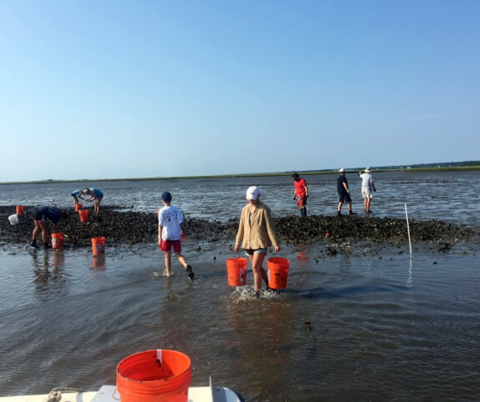Climate Change Impacts on Farmed and Wild Oysters (2024-2025)
Background
Oysters contribute many ecosystem services to coastal communities, support commercial and recreational fisheries and hold considerable economic and cultural value in North Carolina. As a foundation species, they form reefs that contribute to shoreline stabilization, improve water quality, sequester carbon and create habitat for a large diversity of species.
Oyster reefs and farms are located within coastal areas that are subject to considerable temporal and spatial variation in environmental conditions (e.g., temperature, pH, salinity, oxygen, turbidity, nutrient concentrations). Climate change contributes to this variation, and environmental stressors associated with climate change can interact with other stressors (e.g., predation, pathogens) to negatively impact oyster growth and reproduction. In some cases, widespread mortality events occur, but the precise cause(s) of these events remain poorly understood.
North Carolina oyster farmers are already facing major losses from recurring mortalities that primarily occur during the late spring and summer months. Both environmental history and genetic diversity of the oysters can dictate resilience to stress. Disentangling which environmental stressor(s) and which genetic lines dictate oyster performance will provide valuable information that will inform the work of shellfish growers, stakeholders and environmental restoration practitioners.
Project Description
This project team will provide students with training and research experiences in climate change biology, molecular ecology, biogeochemistry and environmental management. Team members will leverage the Duke Aquafarm, Duke University's oyster farm located at the Marine Lab in Beaufort, North Carolina, to monitor and evaluate multiple environmental parameters that contribute to oyster mortality, particularly during the summer when mortality rates tend to be at their highest.
Team members will deploy and maintain a series of oceanographic sensors to continuously monitor environmental conditions including water temperature, salinity, pH, dissolved oxygen and depth. Continuous data collection via sensor deployments will be supplemented by weekly or bi-weekly (dependent on weather) measurements recorded at the Aquafarm using hand-held meter instruments.
In a parallel approach, the team will monitor the performance and growth of the oysters at the Aquafarm by performing weekly or biweekly assessments of size (growth) and mortality. The data will be used to assess changing environmental conditions and their relationship to oyster performance.
Team members will communicate with regional oyster farmers, sharing information via a publicly available web resource. Farmer observations and opinions will guide or generate new areas of study within the project.
Anticipated Outputs
Web resource to store and share environmental data; peer-reviewed publications; conference presentations; materials to share findings with regional farmers; data for grant applications
Student Opportunities
Ideally, this project team will include 2 graduate students and 6 undergraduate students with interests in marine science and conservation, environmental sciences and policy, earth and climate sciences, biology and/or statistical sciences. Students curious about climate change, food security, science communication and working in local coastal communities will be a particularly good fit for the project. At least two members should have experience in data management and analysis. Prospective graduate applicants should be interested in building mentorship and project management skills, and a Ph.D. student will be selected to serve as project manager.
Team leaders in Durham and Beaufort will facilitate collaboration across campuses and provide in-person support to students regardless of their location. All team members will participate in journal clubs and presentations, and will have the chance to gain experience in data collection, fieldwork, leadership, analysis and dissemination of scientific results, academic writing and science communication. Students will develop their communication skills by interacting with regional oyster farmers.
Subteams mentored by graduate student leaders and a project manager will focus on complementary aspects of the project (e.g., measurements at the Aquafarm, sensor deployment/maintenance, data analysis, results dissemination). Students will be invited to join more than one subteam so that there are overlaps in participation across various tasks and goals. Team members will also be provided guidance as they develop independent research questions within the project's framework.
In an optional summer component, three to four students will travel to the Duke Marine Lab to lead fieldwork. Summer team members must be willing to commit 40 hours per week for 10 weeks.
Timing
Summer 2024 ¬– Spring 2025
- Summer 2024 (optional): Deploy and maintain sensors at the Aquafarm; monitor oyster performance; conduct molecular lab work at Duke Marine Lab
- Fall 2024: Start data analysis; continue lab work; develop an online resource for storing and publishing environmental data; develop product for sharing information with regional oyster farmers
- Spring 2025: Complete remaining lab work; deliver product information to farmers; write, review and submit manuscript
Crediting
Academic credit available for fall and spring semesters; summer funding available
Image: Collecting oyster field samples in North Carolina’s coastal waters, by NOAA Office for Coastal Management

Team Leaders
- Elizabeth Albright, Nicholas School of the Environment-Environmental Sciences and Policy
- Nicolas Cassar, Nicholas School of the Environment-Earth and Climate Sciences
- Thomas Schultz, Nicholas School of the Environment-Marine Science and Conservation
- Juliet Wong, Nicholas School of the Environment-Marine Science and Conservation
/yfaculty/staff Team Members
-
Grant Murray, Nicholas School of the Environment-Marine Science and Conservation
